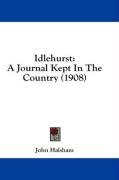idlehurst a journal kept in the country

IDLEHURST A jOURnAL KEPT IN THE COUNTRY - INTRODUCTORY - MY DEAR PATERSON That old question of ours, whether the world were larger to him who travelled far and wide, or to him who sat at home dreaming of the unknown lands, seems no nearer settlement after half a life of experiment than when it was first propounded in Blue Boar Lane sittings, or walks to Wheatley. Fixed here in the Sussex Weald, seldom moving out of the circle of the hills, often keeping within the village bounds for months together, I still maintain my unvisited world to be greater than all the seas and isles which you have profaned, You will remember that when you had spent some tcrl venrs in Borneo, and it seemed probable that - you would end your days there, you so far failed from your old vagrant principles or was it that the old country had now become the stranger land as to look back to England, and to ask me for some account of our country life at home. You were pleased with the idca of a little chronicle of our Arnington days which I proposed to make you, as thc readiest sTay I could find of presenting our country and peoplc. Before my summers journal is well ended, here you are in England again But sincc you are tied in London, where a man is merged and lost, for sure, as wholly as he can be in Sarawak - in London that seems farther from Arnington quietude than your eastern isles-I think you may still entertain my compilation. It may serve in some measure to bring before you in Hampstead the life of the jVeald-a life, I am afraid, that is undistinguished, commonplace enough and yet the length bctwcen that and the pattern-moulded world you look down upon from the Heath Being so little a traveller, I owe my knowledge of considerable portions of rural England to modern novels and I learn from this source that Titanic passions, salient immorality, aid an unintelligible dialect distinguish, singly or in combination, the peasantry of various parts of the British Isles with which I happen to be unacquainted. In Sussex we do not possess these dzfe e zti. An odd transitional state between the old rural economy and a pervading plutocracy has apparently produced a rather respectable and soulless population, protected in its morals by a singular vis ilzertia, and speaking almost universally that dreadful New Englishwhich flows from Thames about the world. Under the attrition of London on the one side and Brighton on the other, we are taking upon LIS a general polish, and losing all individual character. With hardly an exception, the old great families of the county are extinct and their houses have passed into the hands of the bankers, the stockbrokers, the distillers. The names which abide are the common peoples-the Bottings and Tomsetts that fill our registers of 1557. There 1i e in Arnington to-day three generations of Thomas Pococks and a Thomas Pocok appears in the roll of the Sussex archers who were at Agincourt. But beyond the names, little abides. Uniformity of school-methods is wearing down any small excrescences of individual character the very forces of heredity seem powerless beneath the flattening weight of the Standards. Almost every recent legislative change has helped to obliterate thc ancient distinctions with a certain class of our village politicians the effacing of the old inscriptions sccms almost a religion. Whatsoever the mcrits of the emerging Cosmos may be, monotony of thc most t trannous kind must follow the present course of devclopmcnt... --This text refers to the Paperback edition.
Info about the book
Author:
Series:
Unknown
ISBN:
1451019041
Rating:
3/5 (2)Your rating:
0/5
Languge:
English
Users who have this book
Users who want this book
What readers are saying
What do you think? Write your own comment on this book!
write a commentGenre
if you like idlehurst a journal kept in the country try:
Do you want to read a book that interests you? It’s EASY!
Create an account and send a request for reading to other users on the Webpage of the book!



